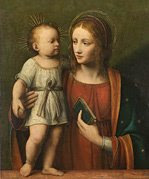I just finished reading The Tale of Despereaux and really enjoyed it. I plan on writing a proper review and got to wondering if I should warn people that it has some less-than-sterile events in it. People die and the rats are truly evil and so on.
But then evil is necessary if we are to see the good. Can we really appreciate the light if we've never experienced darkness. (This btw is one of the underlying themes of The Tale of Despereaux.)
This got me thinking about last year's Milwaukee Catholic homeschool conference where Nancy Brown gave a talk on Chesterton and the case for fairy tales. Chesterton often made a connection between Christianity and fairy tales.
So many people today want sterile stories, homogenized stories, stories filled only with positive, happy events. No conflict, no evil, no fallen characters. Is this a good thing? I don't think so.
First, I think we have to ask ourselves why fairy tales have been around for so many centuries. Did you know that there are 700 versions of Cinderella? It is a universal story that is found in every culture.
Fairy tales show us that, yes, it can be a cruel, cruel world. I mean, come on, little children being thrown into an oven by a horrible witch after being abandoned by their father is not a happy event. But, wait, there is a happy ending. Fairy tales also show there is hope with courage.
No need for courage when you live in a happy, care-free, sterile world.
Fairy tales teach us that virtue wins over evil. They teach us that we can conquer any foe when we meet him head on.
Yep, I think The Tale of Desperaux will get two thumbs ups when I write that review.
Subscribe to:
Post Comments (Atom)










 Stumble It!
Stumble It!
2 comments:
I would like to respond to your question: "Can we really appreciate the light if we've never experienced darkness."
Yes, it IS possible to appreciate light if you have never seen darkness. But in fact we are not talking about a metaphysical truth here - we're talking about ART. It is far easier, not only because of the Fall, but far more because we we are in part PHYSICAL beings - It's not about "possible" but about "appropriate" or even "beautiful".
Er... let me try this another way. It is the mystery of the space, or blank - us ASCII people call it "32" or "0010 0000". All you have to do is look at ancient inscriptions that did not use the space, and you'll understand. The space between words makes it FAR EASIER to read. In a painting, the contrast of light tones and dark reveals more of the picture than a monotonic approach.
Shifting back to the written, rather than the painted, consider the "first" sub-play in GKC's "The Surprise" - where there are NO bad guys. It's a good story, but there is something strange about it - something unCLEAR - as odd as that sounds.
The evil in stories teaches us in two ways, as Dante tries to express in the Divine Comedy: First (hell) by detesting the bad; Second (purgatory) by desiring the good, which is seen more DRAMATICALLY (an ART word, not a science word) against the dark or sordid background. Obviously, one does not write evil into a story in order to explain - er - how to rob a bank, or so forth; the point as GKC says of detective fiction is to detect - which means UNCOVER.
Sometimes I think that's what people object to - that so often "fairy" tales are "detective" tales... something mysterious is uncovered. But the greatest of all Tales is a detective tale: just look at the meeting on the Road to Emmaus, it's the only time in fiction or in history that the Master Detective solves His own murder!
YES, it is possible to see ONLY light, and appreciate it - but it can be unsettling - look at what happened to the Apostles when our Lord was transfigured. Another odd thing is how just about every time an angel appears, the first thing communicated is "Fear Not!"
Anyway this is just a quick sketch, and there is lots more to say about light - both in physics and in art. Nor do I feel there is conflict in our view; just a desire to SEE more. Hee hee.
--Dr. Thursday
PS: another idiom struck me as I re-read this far too lengthy comment. It ties into GKC's point about Aquinas' explanation of why we have revelation (because the Common Man doesn't have time to take the intellectual route). It might also be extended to show that Story (in the abstract) can, should, does, maybe MUST use evil in order to paint its ideas quick enough for the Common Man, who would otherwise be dazzled by the Light. "And the Light shone in the darkness, the darkness could not comprehend it." How Adam's unfallen retina would handle rhodopsin bleaching I don't know - but as I said this is about art not physics. And the sun sent in Eden, even before the Fall.
Thank you Dr. Thursday!!
Post a Comment